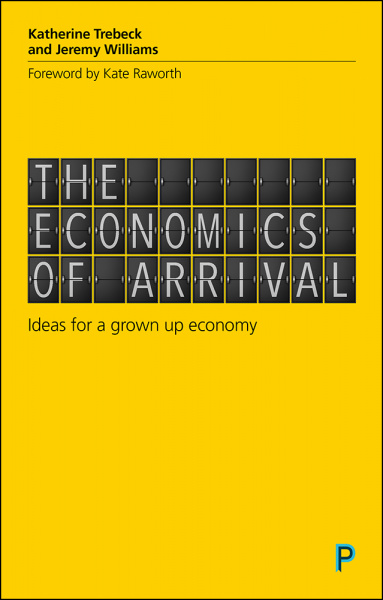The breakdown of the climate will only be averted by rapid and radical action, but political courage and imagination are blunted blocked by narrow definitions of success. In their new book, The Economics of Arrival, Katherine Trebeck of the Rapid Transition Alliance member organisation, the Wellbeing Economy Alliance, and Jeremy Williams propose a new story:
Countries come in all kinds of political colours and stripes, legacies and histories, with important or marginal roles in global affairs. But whatever their stage of development, their governments (almost) all operate with one central measure of success: economic growth measured by GDP.
If the economy is growing, then the country is doing well, is the assumption. Wealth is increasing, so presumably people are being lifted out of poverty, jobs are being created and citizens are enjoying greater freedom, so the thinking goes.
If only it were so simple. Indeed, if it were, it is likely that many of the challenges facing the world wouldn’t be as acute.

Of course, in lower income countries, growth has a vital role to play. Where people don’t have enough to meet their basic needs, more is obviously necessary. Used well, economic growth can unlock opportunity and build out the infrastructure and services that people need. But is it such a legitimate goal in GDP-rich countries?
Previous generations in Britain would look at envy at our time, when poverty could be eradicated by fairer distribution – by sharing its great wealth better. In a sense Britain has arrived in the place its ancestors hoped for. Yet the central purpose of government remains economic growth, not better sharing of our bounty. Growth was the government’s “number one priority” according to Gordon Brown. David Cameron boasted of a “relentless focus on growth” and Theresa May promised to “drive growth up and down the country”, which makes it sound like a bus.
When growth is universally viewed as positive, expansion goes unchallenged and the downsides are ignored: the business media celebrate a rising housing market despite growing numbers of low earners and younger generations who are priced out. High levels of new car registrations are reported as good news regardless of the implications for traffic, CO2 emissions, air pollution and personal debt. Supermarket firms open new branches and increase their market share, but in GDP metrics no heed is paid to dying town centres or bankrupt farmers.
Most of us would agree that we want thriving town centres, clean air, low congestion, a stable climate, affordable homes and equal opportunities for young people. Some of the solutions to those problems are compatible with growth, and some aren’t. Anything that may result in lower economic growth is off the table.
Take the example of aviation, which should not be expanding in an age of climate change. The trade-off was starkly expressed in the airport town of Luton recently: “I quite take on board the air quality point being made”, said the council leader in a debate about pollution. “But we’re not going to not grow the airport… We’re not going to stop economic growth. It’s not going to stop, is it?”
There’s a striking powerlessness in that statement – ‘it’s not going to stop, is it?’ Like a runaway train or an avalanche.
The unstoppable demands of growth are apparently a given. It’s common wisdom, part of the guiding mythology of our time. But it’s a story, a shorthand way of making sense of the world: the economy will grow, and we will all be better off as the rising tide lifts all boats.
But what if we took growth to its logical conclusion? All growth leads somewhere. Nothing grows forever, but proceeds to maturity. If we prize economic growth, shouldn’t we look forward to a point of ‘arrival’, at which the economy is fully grown?
This Arrival would be something to celebrate. It would be the fulfilment of hopes, and the start of a new purpose. It would defuse the drive for more that slows down genuine solutions. New priorities would emerge beyond growth: inclusion, participation. Industry and business would focus on the resources it already has rather than extracting more, creating a regenerative circular economy. Politics would look to the wellbeing of citizens to measure their success. Having arrived in a place of plenty, nations could now make themselves at home.
To see what this might look like in practice, we can look at cooperative and employee-owned businesses that know that creating good workplaces and decent incomes are as important – or more important – than profits and expansion. We can see cities using participative budgeting or community planning processes to give residents a voice. There are businesses finding new opportunities in sustainable materials. Democratic forms of energy are emerging in the confluence of renewable technologies and community business models. The internet is facilitating a shift from consumerism to ‘experientialism’, and opening up all kinds of spaces for shared ownership or exchange. Governments are experimenting with new metrics. From Vivir Bien in Latin America to the traditional notion of ‘Nuka’ in Alaska or the ‘sufficiency economy’ in Thailand, people are drawing on older and more holistic visions of success.
Many of these are isolated examples, and they need to be amplified, scaled up and championed. But there’s no question that all the tools we need for a fairer and more sustainable world are already out there. A transition is possible – and necessary too. Without some sense of Arrival, of enough, the richer countries of the world risk throwing away all the gains so far. Prosperity would be eroded by debt, inequality, climate change and extreme politics. The hard work of previous generations would be wasted, leaving a poorer future for those who come after us. And that would indeed be a tragedy.
The Economics of Arrival: Ideas for a grown-up economy is out now from Policy Press.

